Nine features that redefine what fast, reliable, and intelligent field service looks like.
“The field service industry loses $60 billion annually due to inefficient scheduling and poor resource management,” according to Aberdeen Group research. Yet most companies still rely on outdated field service management software that treats FSM as an afterthought rather than a strategic advantage.
Here’s the reality: your competition isn’t just other service providers anymore. It’s Amazon’s same-day delivery expectations. It’s Uber’s real-time tracking transparency. It’s the digital-first world where customers expect instant updates, seamless field service experiences, and flawless execution every single time.
But what if your field service management system could actually become your competitive edge instead of a cost center? The best FSM software platforms in 2025 are transforming how companies deliver field services, manage mobile workforces, and optimize service operations.
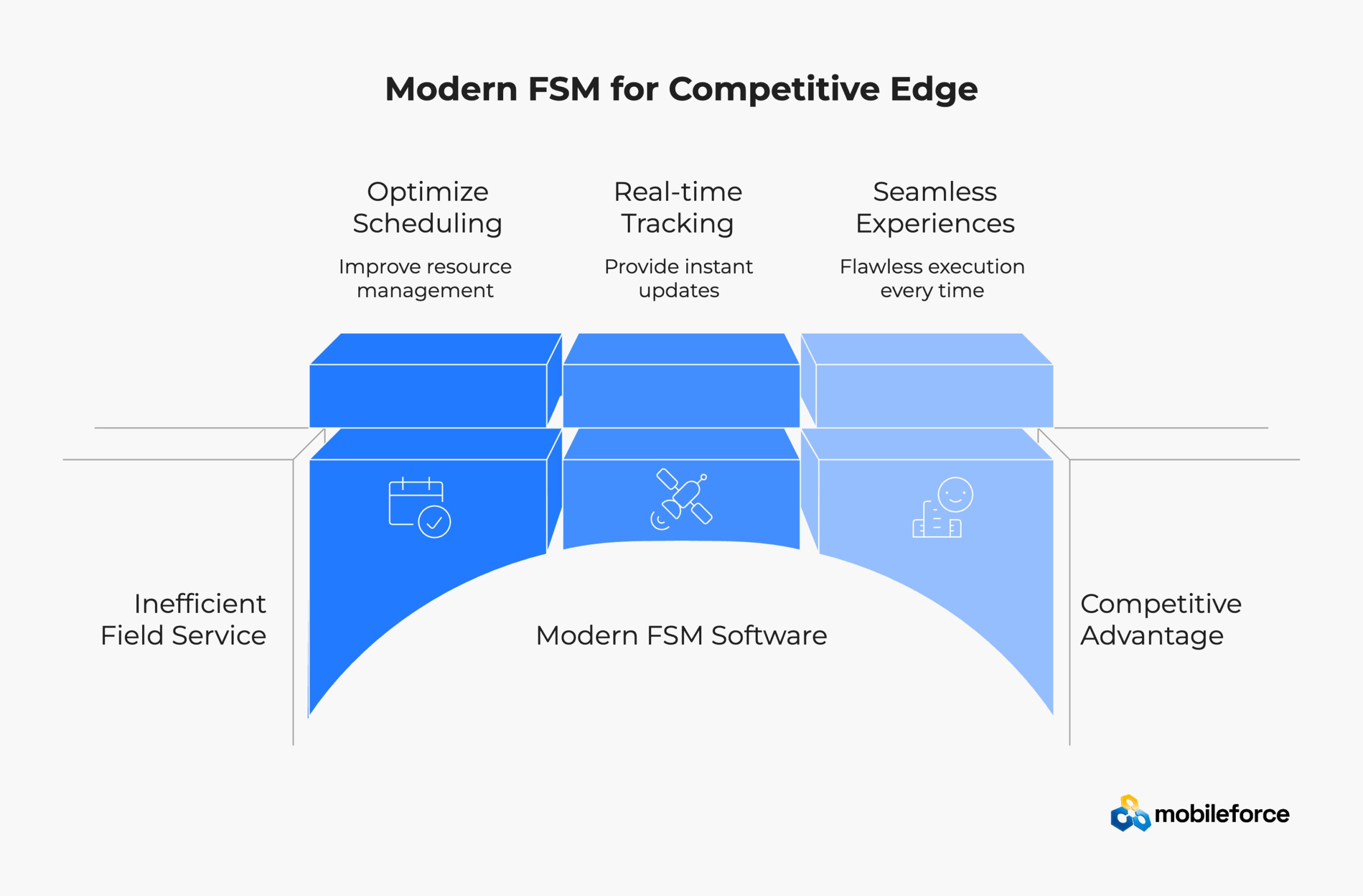
The field service management software landscape has evolved dramatically. Companies that once viewed FSM solutions as necessary operational expenses now recognize field service platforms as growth engines. Smart organizations leverage advanced field service management systems not just to fix problems, but to create new revenue streams, improve customer relationships, and optimize resource allocation.
Ready to see how these field service management features could transform your operations? Schedule a personalized FSM demo to explore Mobileforce’s capabilities firsthand.
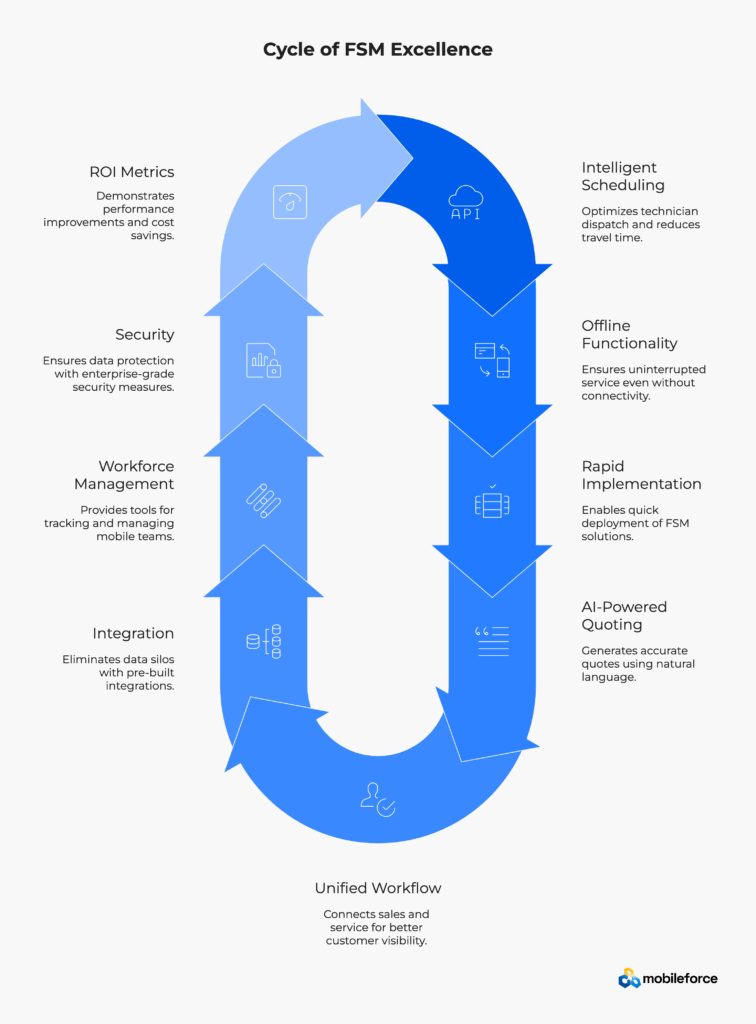
Remember when field service scheduling meant staring at a whiteboard covered in sticky notes, trying to figure out which technician could handle Tuesday’s emergency service call? Those days are gone, but surprisingly, many FSM software solutions still operate like digital versions of that same whiteboard.
Mobileforce’s intelligent field service scheduling system thinks differently about workforce management. It doesn’t just match available time slots – it considers technician skills, current location, traffic patterns, and even historical performance data to make scheduling decisions that would take a human dispatcher hours to calculate.
The system’s dynamic dispatch capabilities automatically handle the chaos that defines field service operations. When an emergency call comes in at 2 PM, the field service platform doesn’t just find the nearest technician. It evaluates who has the right certifications, which jobs can be rescheduled without penalty, and how to minimize disruption to the entire day’s service schedule.
According to Aberdeen Group research, companies using intelligent field service scheduling see average productivity gains of 18-25%. This improvement in field service efficiency directly impacts customer satisfaction and operational costs.
What makes this field service scheduling particularly powerful is the real-time GPS integration. The FSM system knows exactly where each technician is, not where they’re supposed to be. When traffic backs up on Highway 101, it automatically adjusts arrival estimates and sends proactive notifications to customers. When a service job finishes early, it immediately identifies opportunities to move appointments forward.
The automated territory and skills matching pulls directly from existing CRM systems, so there’s no duplicate data entry in the field service management workflow. A technician certified for HVAC repair in the North Bay automatically appears in the scheduling pool for relevant service calls in that region. The FSM software even learns from patterns – if certain types of field service jobs consistently run long, it builds buffer time into future similar appointments.
Discover how intelligent scheduling could optimize your field service operations. Request a field service management demo to see dynamic dispatch in action.
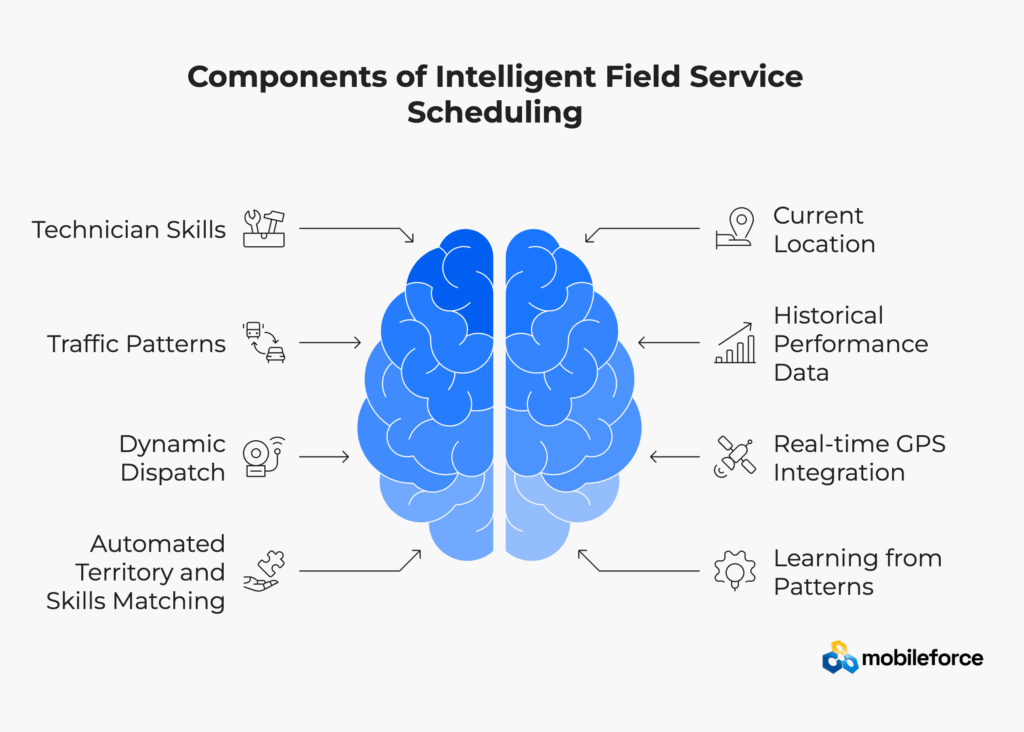
“We’ll need to order that part” – four words that can destroy a customer relationship and double your service costs. Yet most field service management platforms treat inventory management as an afterthought, leaving technicians to guess what they need or maintain separate tracking systems outside their FSM software.
Mobileforce integrates comprehensive inventory and work order management directly into the field service platform. Technicians can check parts availability in real-time, reserve items for specific service jobs, and even see delivery estimates from back-office systems – all from the same mobile FSM interface they use for everything else.
The digital work orders capture everything: service history, photos, customer signatures, and parts consumption. But here’s what separates it from basic digital forms in other FSM solutions – the system understands context. When a technician scans a serial number, it automatically pulls warranty information, service history, and related parts inventory from the field service database.
Real-time inventory updates prevent the frustration of driving to a service job only to discover the necessary parts aren’t available. The FSM platform tracks parts across multiple locations, so if the main warehouse is out of stock, it automatically checks regional depots and even other technicians’ truck inventories.
For warranty and maintenance services, technicians can add new service agreements directly from the field using the mobile FSM app. A simple repair call can become a comprehensive maintenance contract without requiring separate sales processes or administrative overhead in the field service workflow.
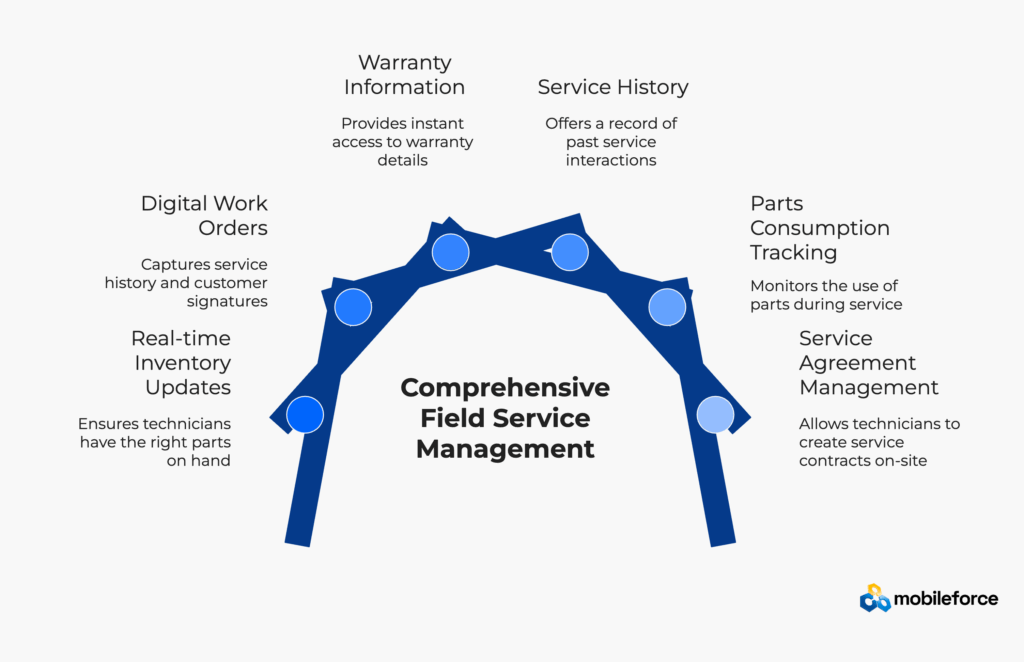
Here’s a scenario every field service manager knows: Your technician drives into a rural area for a critical repair, only to discover there’s no cell coverage. With most field service management software, that means reverting to paper forms, sticky notes, and hoping everything syncs correctly when they get back to civilization.
Mobileforce built their FSM platform with an offline-first philosophy, not as an afterthought like many field service solutions. This means complete mobile FSM functionality – work orders, inventory checks, quote generation, even complex calculations – work exactly the same whether you’re connected to enterprise WiFi or standing in a cornfield in Nebraska.
The difference isn’t just technical; it’s philosophical. Most field service management competitors add offline capabilities by caching data and hoping for the best. MobileForce designed every feature to work offline from the ground up, then added intelligent synchronization that resolves conflicts and updates records when connectivity returns.
According to Forrester research, 67% of field service calls happen in areas with poor or intermittent connectivity. For industries like utilities, mining, or rural telecommunications, offline field service capability isn’t a nice-to-have – it’s mission-critical for FSM success.
The offline digital forms include barcode scanning and auto-populate capabilities that work without any network connection in the field service environment. Technicians can scan equipment serial numbers, generate quotes, collect signatures, and process payments completely offline. When connectivity returns, everything syncs seamlessly with conflict resolution that preserves data integrity in the field service database.
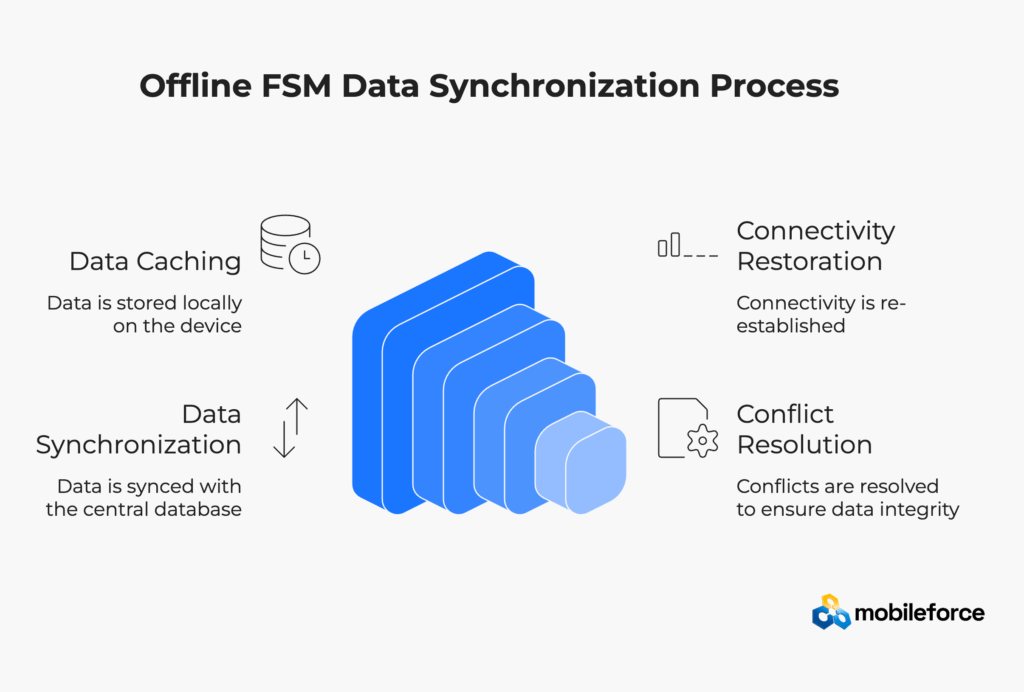
“We love your FSM software, but we need it to work exactly like our current field service process.” Sound familiar? Most field service management implementations fail because they force companies to choose between speed and customization. Either you get a quick FSM deployment that doesn’t fit your workflow, or you get heavy customization that takes months and costs more than your annual coffee budget.
Mobileforce’s no-code FSM architecture eliminates this false choice in field service management. The visual workflow builders let non-technical users create complex field service processes that would typically require months of developer time.
Need approval workflows that route high-value quotes to regional managers in your FSM system? Drag and drop. Want custom forms that auto-populate based on equipment type in your field service workflow? Point and click. Require integration with your proprietary ERP system for field service data? The visual API builders handle it without writing a single line of code.
This isn’t about dumbing down FSM functionality – it’s about democratizing field service customization. IT teams can focus on strategic initiatives instead of configuring forms in the field service management system. Operations managers can adjust workflows based on real-world feedback without waiting for the next development sprint.
The typical FSM implementation timeline of 4-8 weeks versus the industry standard of 6-18 months isn’t marketing hyperbole – it’s the natural result of eliminating the development bottleneck in field service deployments. Companies can start with basic field service functionality and gradually add complexity as their teams become comfortable with the FSM platform.
Want to see how no-code configuration accelerates FSM implementations? Schedule a field service management consultation to explore customization options.
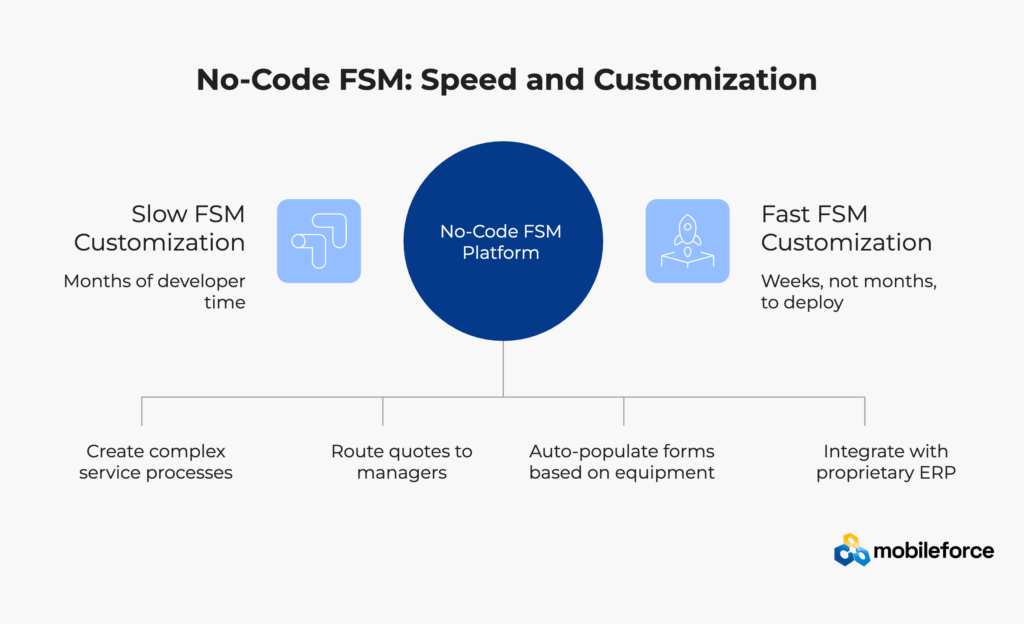
“Can you quote a complete HVAC system for a 50,000 square foot warehouse with zone control and energy monitoring?” In traditional field service systems, that question might take an experienced technician 30 minutes and three phone calls to headquarters. With Mobileforce’s AskCPQ™ engine, it takes about 30 seconds.
The AI-powered field service quoting doesn’t just pull data from price sheets – it understands relationships between products, compatibility requirements, and even local regulations. Ask for a quote on electrical upgrades, and it automatically considers panel capacity, code requirements, and seasonal labor variations in the field service estimate.
This conversational approach transforms how field service teams interact with complex product catalogs. Instead of navigating through dozens of product categories and option menus in traditional FSM software, technicians can literally describe what the customer needs in natural language. The AI interprets the request, suggests appropriate solutions, and generates accurate field service quotes with real-time pricing.
The FSM system learns from every interaction. If technicians consistently add specific accessories to certain product configurations, AskCPQ™ begins suggesting those combinations proactively. It understands seasonal patterns, regional preferences, and even individual customer history to provide increasingly accurate field service recommendations.
For complex B2B sales cycles, the AI can generate multiple configuration options with different price points, helping field service technicians present good-better-best alternatives that align with customer budgets and requirements.
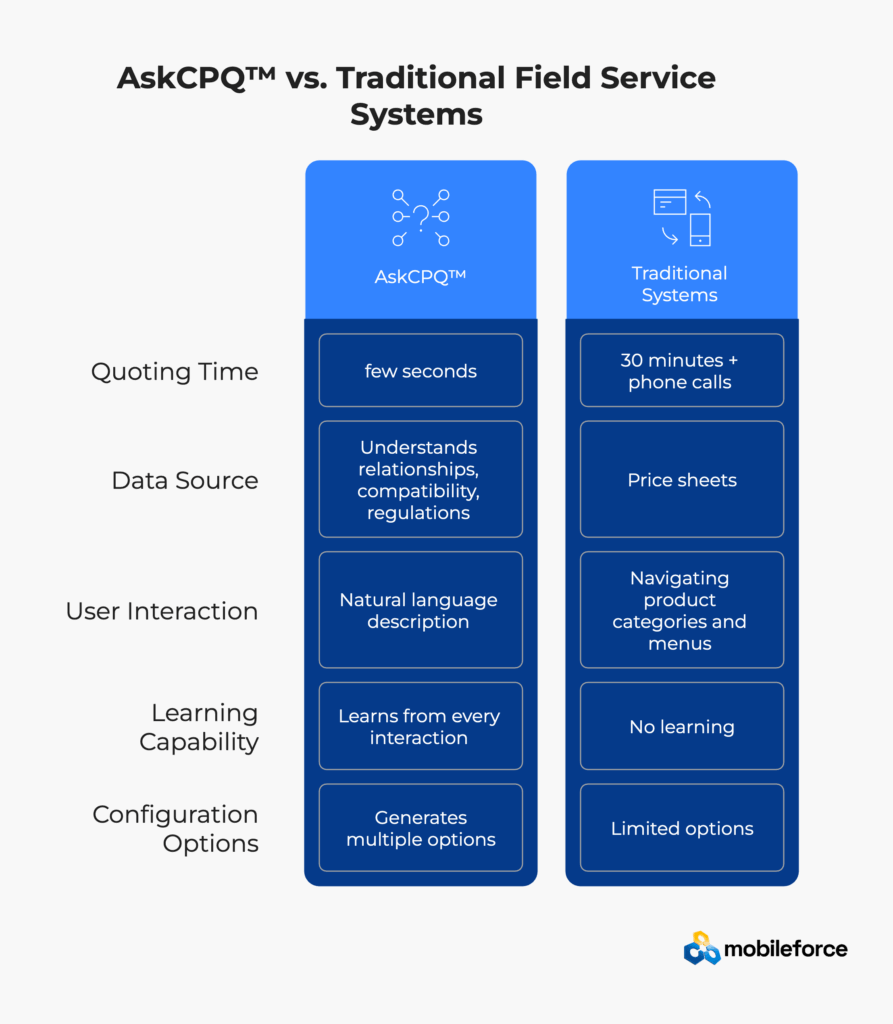
Most companies operate with artificial boundaries between sales and field service operations. The sales team generates quotes using one system, service technicians use a completely different FSM platform, and accounting reconciles everything with yet another tool. This fragmentation creates delays, errors, and missed opportunities in the field service workflow.
Mobileforce pioneered the quote-to-cash-to-service concept, recognizing that these processes are naturally connected parts of the customer lifecycle. When a technician generates a repair estimate, that quote can seamlessly become a work order, which can automatically trigger parts ordering, which can generate accurate invoicing – all within the same field service management platform.
This unified FSM approach creates powerful downstream effects. Customer service representatives can see the complete relationship history: what was quoted, what was delivered, what’s under warranty, and what might need attention soon. Field service technicians arrive at service calls with complete context about previous interactions, quote history, and customer preferences.
The FSM platform accepts payments through built-in credit card processing or PayPal integration, so technicians can close transactions in the field rather than creating administrative overhead for billing departments. This isn’t just convenient – it dramatically improves cash flow by eliminating the traditional 30-60 day collection cycle in field service operations.
For service organizations, this integration enables new revenue models within the FSM workflow. A simple repair call can identify opportunities for preventive maintenance contracts, equipment upgrades, or complementary services – all handled through the same workflow that generated the original work order.
Ready to eliminate silos in your field service operations? Book a quote-to-cash-to-service demo to see unified workflows in action.
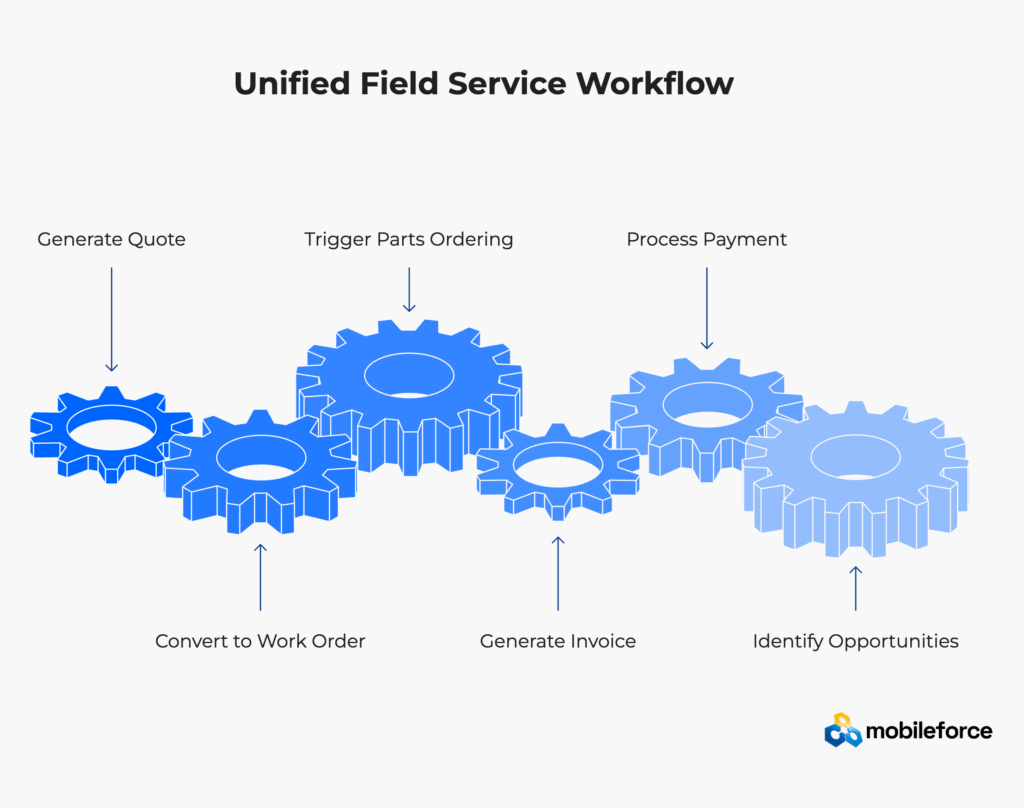
“Can it integrate with our [insert obscure industry-specific software here]?” This question haunts FSM evaluations because most field service platforms treat integration as a custom development project rather than a core capability.
Mobileforce provides 200+ pre-built connectors for CRM, ERP, and business applications, treating field service integration as a configuration exercise rather than a development project. Built-in connections to Salesforce, HubSpot, Microsoft Dynamics, and SugarCRM mean your existing customer data becomes immediately actionable for field service operations.
The collaboration connectors extend this philosophy to document management, connecting seamlessly with Google Drive, Box, Dropbox, and SharePoint. Field service technicians can access technical manuals, compliance documents, and customer files without switching between applications or wondering whether they have the latest version.
But field service integration isn’t just about data sharing – it’s about workflow continuity. When a CRM opportunity moves to “Closed-Won,” the FSM platform can automatically generate work orders, schedule installation appointments, and notify the appropriate technicians. When field work is completed, customer records update automatically with service history, parts consumed, and follow-up requirements.
According to McKinsey research, companies with integrated digital platforms see 20-30% improvements in operational efficiency compared to those using disconnected point solutions.
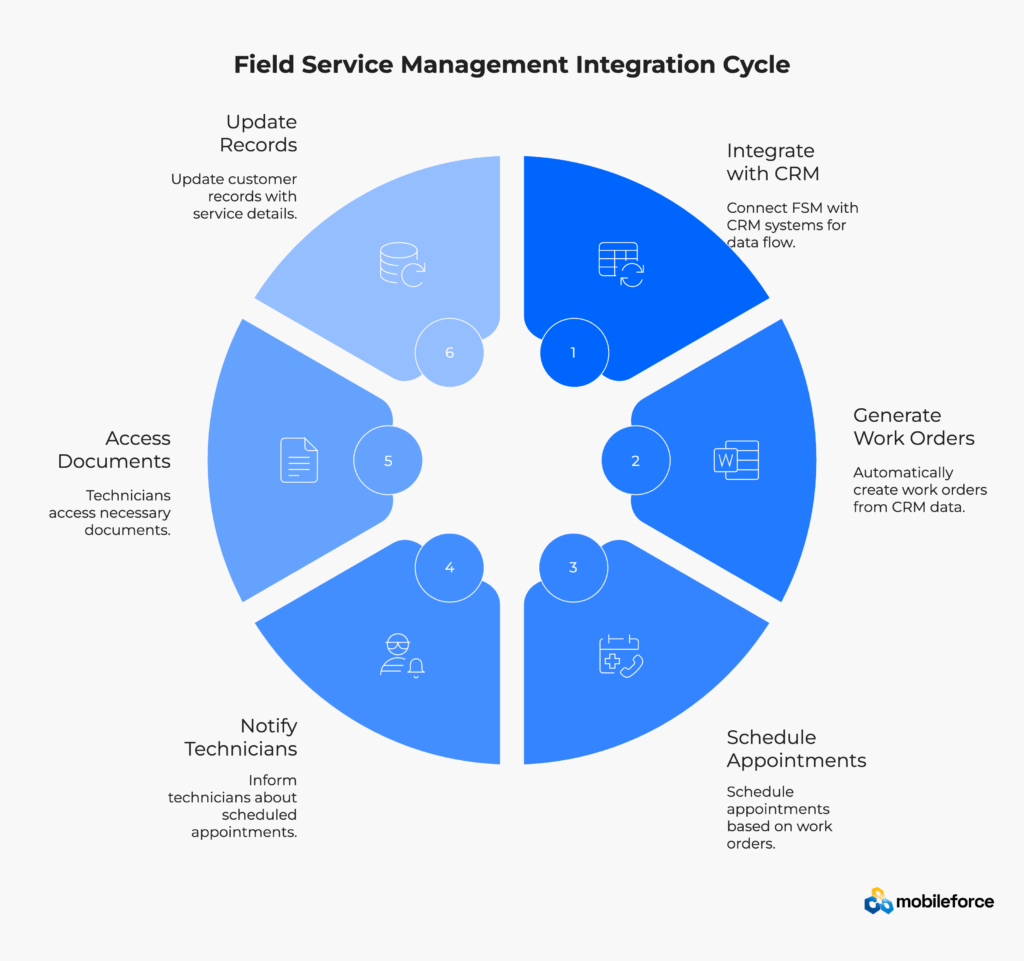
The average field service technician carries thousands of dollars worth of tools, but too often their most important tool – information access – remains frustratingly limited. Traditional mobile FSM apps feel like stripped-down versions of desktop software rather than purpose-built tools for mobile work environments.
Mobileforce’s mobile field service platform provides full functionality whether technicians prefer native apps or responsive web interfaces. The barcode scanning capabilities work for everything from parts identification to equipment serial numbers, automatically populating forms and pulling related information from connected systems.
Digital signature capture isn’t just about replacing paper – it’s about creating legally compliant records that integrate automatically with billing and compliance systems in the field service workflow. GPS tracking provides real-time location awareness without feeling invasive, helping dispatchers make informed decisions and customers track service arrival times.
The worker clock-in/clock-out functionality captures precise job timing for accurate invoicing while providing operations managers with visibility into actual versus estimated completion times. This data becomes invaluable for improving future field service scheduling accuracy and identifying training opportunities.
Mobile FSM forms work identically online and offline, ensuring consistent processes regardless of connectivity. Technicians in remote locations can complete complex inspections, generate detailed reports, and even process payments with confidence that everything will sync properly when network access returns.
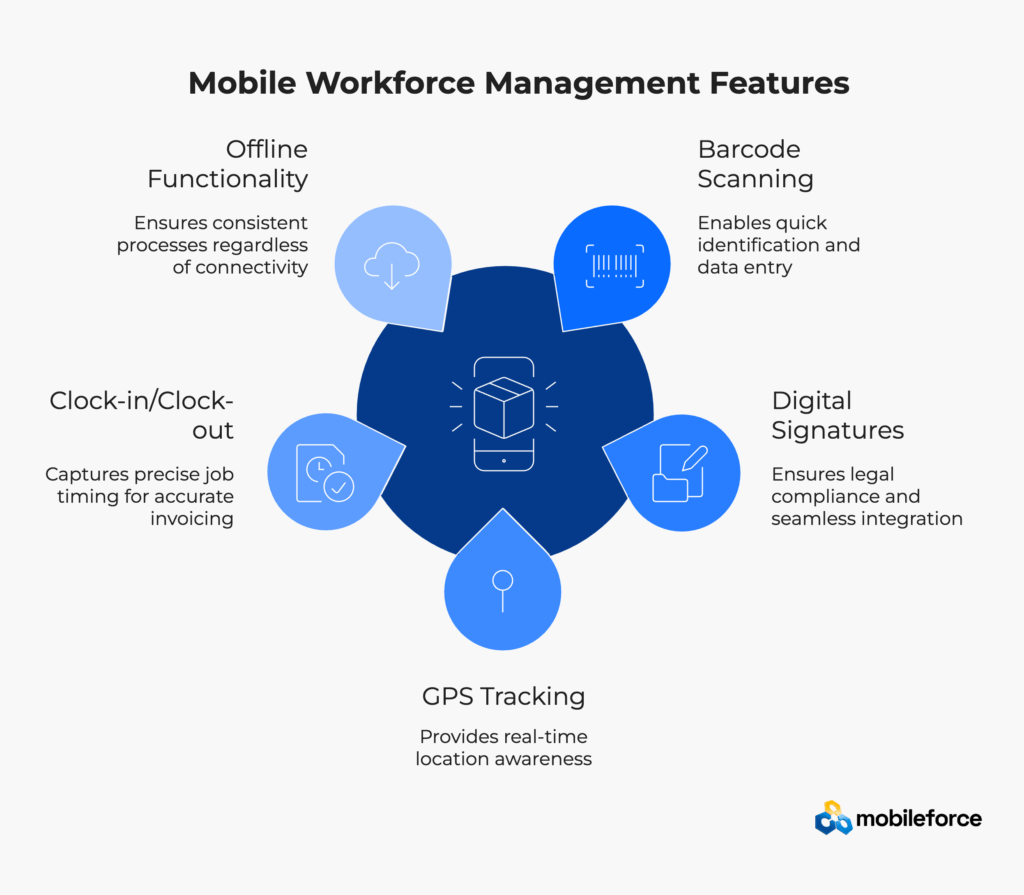
“How’s our field service performance?” shouldn’t require pulling reports from six different systems and spending three hours in Excel. Yet many organizations struggle to get basic visibility into field service operations because their data lives in disconnected silos outside their FSM platform.
Mobileforce’s built-in analytics dashboards provide real-time insight into field service operations without requiring separate business intelligence tools. Track warranty and maintenance contracts, monitor technician productivity, and identify bottlenecks that impact customer satisfaction in your field service management system.
The field service analytics go beyond basic reporting to provide actionable insights. If first-time fix rates drop in a specific region, the FSM system can identify whether it’s a training issue, parts availability problem, or scheduling challenge. When travel time increases, it highlights opportunities for territory optimization or technician redeployment.
Performance tracking capabilities help managers identify top performers and understand what makes them successful, enabling knowledge transfer and continuous improvement across the entire field service team. The system can track both operational metrics (completion times, travel efficiency) and customer satisfaction indicators (callback rates, survey scores).
For organizations managing service contracts, the FSM platform tracks SLA compliance and identifies proactive maintenance opportunities before equipment failures occur. This predictive capability transforms field service from reactive repair to proactive asset management.
Interested in seeing how comprehensive analytics could improve your field service operations? Request an FSM analytics demo to explore dashboard capabilities.
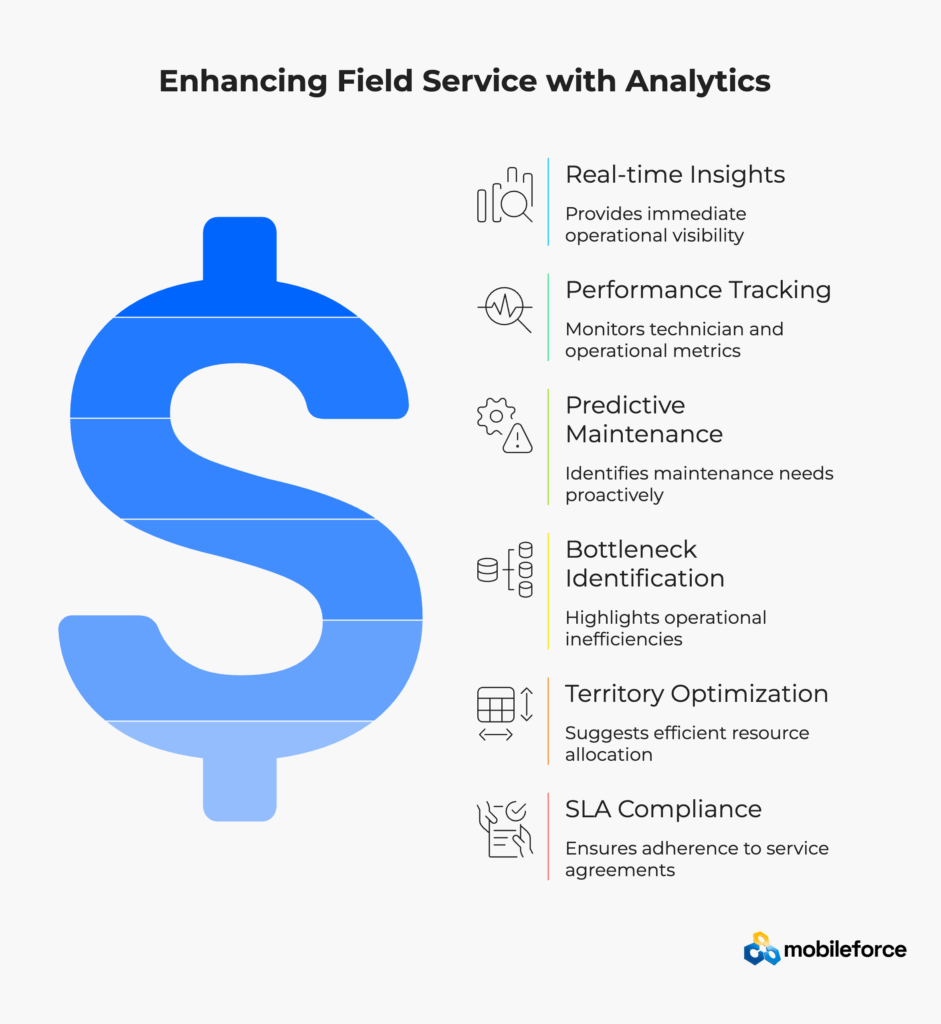
Individual FSM features matter, but the real competitive advantage comes from how well everything works together in your field service management system. Mobileforce doesn’t just provide a collection of field service tools – it creates a unified FSM platform where intelligent scheduling informs inventory management, where AI-powered quoting connects to real-time service delivery, and where mobile workforce capabilities seamlessly integrate with back-office operations.
The measurable field service results speak for themselves: companies report 140% better performance across speed, usability, and business outcomes. Quote-to-close time drops by an average of 45%, while field sales productivity increases by 25-35% using the integrated FSM approach.
But perhaps most importantly, the 4-8 week FSM implementation timeline means organizations can start realizing these field service benefits quickly rather than waiting months for complex deployments. In today’s rapidly evolving business environment, speed of field service management implementation often matters more than feature completeness.
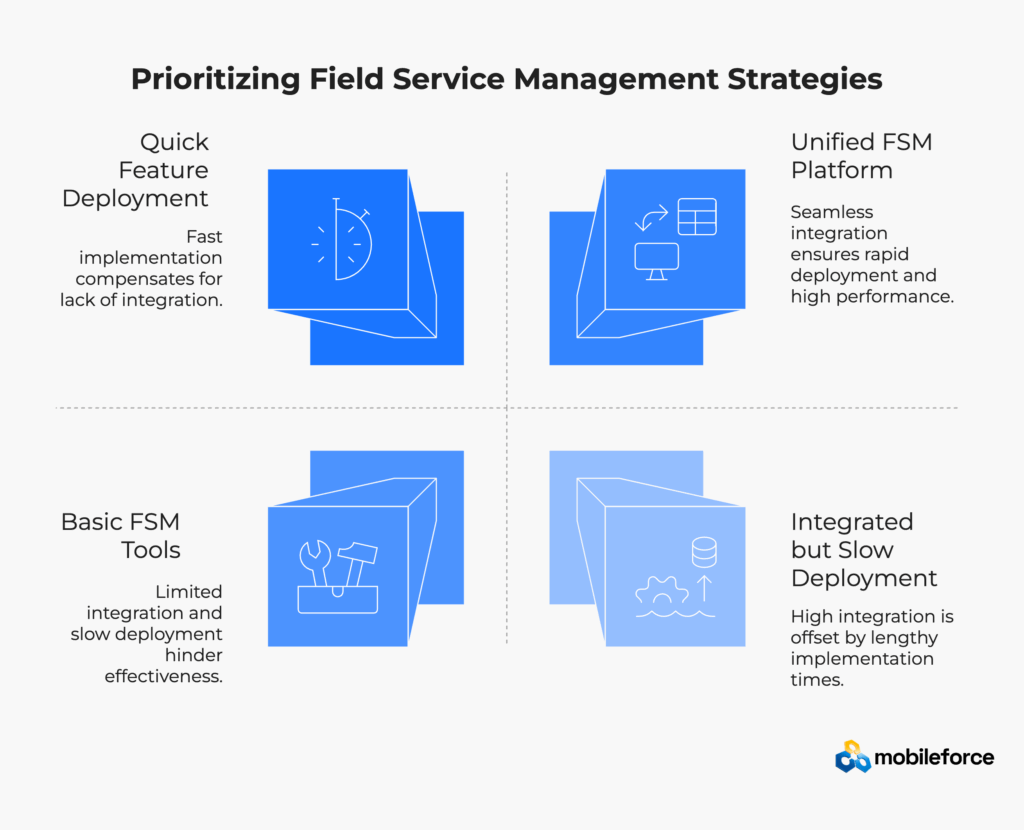
Mobileforce built their field service management platform with offline-first architecture, meaning every FSM feature works identically whether connected or disconnected. Most field service competitors add offline as an afterthought by caching data, which limits functionality and creates sync issues. Mobileforce technicians can generate quotes, process payments, scan barcodes, and complete complex forms entirely offline, with intelligent synchronization when connectivity returns to the field service system.
Mobileforce typically deploys field service management systems in 4-8 weeks versus 6-18 months for enterprise FSM competitors. This speed comes from the no-code configuration platform that eliminates custom development requirements in field service implementations. Companies can start with core FSM functionality and add complexity gradually, rather than waiting for a complete field service system before going live.
Yes, Mobileforce provides 200+ pre-built connectors for popular business applications including Salesforce, HubSpot, Microsoft Dynamics, SugarCRM, and major ERP platforms. These aren’t custom field service integrations – they’re plug-and-play configurations that maintain real-time data synchronization without development overhead in your FSM implementation.
AskCPQ™ is Mobileforce’s AI-powered quoting engine that uses natural language processing to generate field service quotes conversationally. Instead of navigating complex product catalogs in traditional FSM software, technicians can describe customer requirements in plain English and receive intelligent configurations that consider product relationships, compatibility requirements, and local regulations. The field service system learns from interactions to provide increasingly accurate recommendations.
Mobileforce connects traditionally separate processes in a unified field service management platform. A repair estimate generated by a technician automatically becomes a work order, triggers parts ordering, and creates accurate invoicing – all within the same FSM system. This eliminates data re-entry, reduces errors, and provides complete customer relationship visibility across sales and service teams in the field service workflow.
Companies typically see 140% better performance across speed, usability, and business outcomes, with 45% reduction in quote-to-close time and 25-35% increased field productivity using Mobileforce FSM. The specific ROI depends on current process efficiency and field service implementation scope, but the 4-8 week deployment timeline means benefits begin accruing quickly rather than after lengthy FSM implementation periods.
Mobileforce FSM scales from small service businesses to large enterprises. The Professional Plan at $35 per user/month and Enterprise Plan at $80 per user/month provide flexible pricing for different organizational sizes. The no-code configuration and rapid implementation make it accessible for smaller field service operations, while the advanced features and integrations serve complex enterprise field service requirements.
Mobileforce provides enterprise-grade security including single sign-on (SSO), role-based access control (RBAC), and comprehensive access controls. The field service platform maintains data encryption, secure API connections, and compliance frameworks suitable for regulated industries while preserving usability for field service technicians and managers.
See how no-code FSM can revolutionize your field service operations